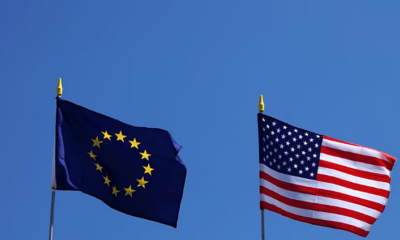Tech
EU Political Ad Ban Sparks Fears of Boosting Illiberal Regimes

The European Union’s new rules on political advertising, set to take effect in October 2025, have prompted tech giants Meta and Google to suspend all political and social advertising across Europe. While the legislation was intended to promote transparency and fairness in election campaigns, critics warn it could inadvertently strengthen the hand of authoritarian-leaning governments that dominate traditional media.
The Regulation on the Transparency and Targeting of Political Advertising (TTPA) is designed to make paid political content more accountable by limiting microtargeting and requiring disclosure of who finances campaigns. But with the withdrawal of the two largest digital platforms from the market, opposition parties across the continent could lose one of their most important avenues to reach voters.
Hungary as a test case
The potential pitfalls of the new regime are already clear in Hungary, where Prime Minister Viktor Orbán’s ruling Fidesz party commands overwhelming control of the media landscape. Over the past decade, Fidesz has consolidated influence over regional newspapers, public broadcasters, and pro-government outlets, while bolstering its message through political networks operating under the guise of civil society organisations.
For Hungary’s opposition, social media advertising has been one of the few tools available to challenge the government’s dominance of traditional channels. The ban on paid political ads threatens to strip them of that platform ahead of the country’s next general election in 2026.
Analysts say Fidesz is well placed to adapt to the new environment. Its network of loyal organisations and state-friendly newspapers is expected to find ways to spread government-aligned narratives online through proxies and content presented as organic rather than paid. Meanwhile, rural communities—already exposed primarily to government-influenced media—are likely to remain a stronghold for Fidesz messaging.
Risks of distortion
Although the EU’s rules are intended to curb manipulation and ensure a level playing field, some observers argue they could achieve the opposite effect in countries where checks and balances are weak. “The absence of paid online advertising may look like neutrality, but in practice it removes one of the few tools available to weaker political actors,” one European policy analyst noted.
Without access to digital ad space, opposition groups will struggle to counterbalance governments that command state resources and dominate the airwaves. In such contexts, critics fear the changes could tilt electoral competition even further in favour of ruling parties.
As the 2026 Hungarian elections approach, the EU’s reform is set to face its first major test. While the TTPA was designed to make democracy more transparent, the unintended consequences risk creating an uneven playing field—allowing illiberal regimes greater freedom to shape public opinion and tighten their grip on power.
Tech
Northvolt Collapse Raises Questions Over Europe’s Green Tech Ambitions
Tech
ESA and GSMA Launch €100 Million Initiative to Advance Europe’s 6G and AI Ambitions

Europe has stepped up its push to lead in next-generation connectivity with a new partnership between the European Space Agency and the GSMA aimed at strengthening 6G and artificial intelligence capabilities through satellite-based communications.
The two organisations announced at the Mobile World Congress a joint funding programme worth up to €100 million to accelerate the integration of satellite and terrestrial mobile networks, known as non-terrestrial networks (NTN). The initiative marks one of Europe’s most significant public investments to date in hybrid satellite-mobile infrastructure.
Antonio Franchi, head of the 5G/6G NTN Programme Office at ESA, described connectivity as the backbone for unlocking advanced technologies. He said the funding would support the development of networks, services and digital tools that could benefit industries and society at large as digital transformation expands.
The programme is open to companies and organisations based in EU member states, which can apply by submitting formal proposals to ESA. Projects will be selected following an evaluation process.
Funding will focus on four core areas: artificial intelligence-driven management of multi-orbit satellite and ground networks; direct-to-device connectivity for smartphones and Internet of Things devices; collaborative 5G and 6G testing platforms; and early research into edge intelligence and advanced IoT systems.
The types of applications envisioned include telemedicine and telesurgery, autonomous driving systems and precision agriculture, all of which depend on reliable, high-capacity connectivity. By merging satellite coverage with mobile infrastructure, the initiative aims to extend high-speed communication even to remote regions.
Alex Sinclair, chief technology officer at GSMA, said combining the mobile industry’s global reach with ESA’s expertise in space technology would help usher in a new era of connectivity and deliver transformative benefits.
The move comes as global competition intensifies in satellite internet and advanced communications, with US companies currently holding a strong position. European officials say the continent’s strength in high-tech manufacturing and specialised software can offer an independent and competitive alternative.
Several European firms are showcasing their work under the programme at MWC, including Nokia, Filtronic, OQ Technology and MinWave Technologies. Demonstrations include live displays of hybrid network architectures and orchestration of satellite-terrestrial systems.
A centrepiece of the exhibition highlights Europe’s space ambitions through a mixed-reality model of ESA’s Argonaut lunar lander, designed to deliver cargo to the Moon. Visitors can remotely operate a training rover via a live satellite link, underscoring how Europe’s connectivity infrastructure is intended to support not only terrestrial innovation but also future lunar missions.
Tech
Mobile World Congress Opens in Barcelona With Focus on AI and 5G Concerns
-

 Entertainment2 years ago
Entertainment2 years agoMeta Acquires Tilda Swinton VR Doc ‘Impulse: Playing With Reality’
-

 Business2 years ago
Business2 years agoSaudi Arabia’s Model for Sustainable Aviation Practices
-

 Business2 years ago
Business2 years agoRecent Developments in Small Business Taxes
-

 Home Improvement1 year ago
Home Improvement1 year agoEffective Drain Cleaning: A Key to a Healthy Plumbing System
-

 Politics2 years ago
Politics2 years agoWho was Ebrahim Raisi and his status in Iranian Politics?
-

 Business2 years ago
Business2 years agoCarrectly: Revolutionizing Car Care in Chicago
-

 Sports2 years ago
Sports2 years agoKeely Hodgkinson Wins Britain’s First Athletics Gold at Paris Olympics in 800m
-

 Business2 years ago
Business2 years agoSaudi Arabia: Foreign Direct Investment Rises by 5.6% in Q1





























